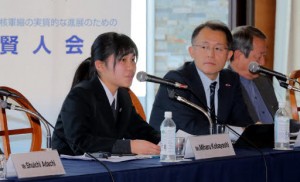High school students and other citizens call on Japan to advance nuclear abolition at meeting of Group of Eminent Persons
Nov. 29, 2017
by Yoshiaki Kido, Staff Writer
At the Group of Eminent Persons Conference, taking place in Hiroshima, family members of A-bomb microcephaly patients and high school students took part in a session to exchange views with the meeting participants from various nations. As representatives from the A-bombed city, they stressed the inhumane consequences of nuclear weapons and urged that the participants work to create a concrete path toward the abolition of nuclear arms.
Seventeen people from A-bomb survivor groups and non-governmental organizations (NGOs) met with the 16 participants of the Group of Eminent Persons Conference. Four people began by making an appeal to the conference participants. Yoshio Nagaoka, 68, a resident of Asaminami Ward and president of the Kinoko-Kai (Mushroom Club), a group consisting of A-bomb microcephaly patients and their supporters, shared the story of his elder brother, who was exposed to the atomic bombing while in his mother’s womb and has led a difficult life due to his cognitive disabilities. Mr. Nagaoka criticized the idea of maintaining peace with nuclear weapons, and argued that it was impossible for such weapons to preserve peace because of their potential to harm a human fetus, which has nothing to do with fighting out in the world.
Miharu Kobayashi, 17, a second-year student at the high school attached to Hiroshima University and a 20th annual High School Student Peace Ambassador, presented the speech in English that she was not able to deliver at the Conference on Disarmament in Geneva, Switzerland in August, due to a protest from China. Ms. Kobayashi shared the sorrow of her grandfather, whose mother was killed in the atomic bombing, and called for Japan to ratify the nuclear weapons ban treaty as soon as possible and take stronger action for the cause of nuclear abolition.
Angela Kane, the former U.N. High Representative for Disarmament Affairs from Germany, made a comment from the conference participants, touching on the fact that the International Campaign to Abolish Nuclear Weapons (ICAN) was awarded the Nobel Peace Prize. She told the audience that she now expects people to recognize, more widely, that ordinary citizens can help advance the abolition of nuclear arms. On the other hand, George Perkovich, the vice president of the Carnegie Endowment for International Peace, made remarks that cast doubt on the viability of outlawing nuclear weapons.
On this day, some NGO members met with Izumi Nakamitsu, the U.N. Under Secretary General and High Representative for Disarmament Affairs, at the Peace Memorial Museum in Naka Ward. Ms. Nakamitsu said firmly, “Nuclear abolition cannot be realized until the United Nations, national governments, and civil society are united. Though there is pessimism, this goal is reachable if we work together.”
(Originally published on November 29, 2017)
At the Group of Eminent Persons Conference, taking place in Hiroshima, family members of A-bomb microcephaly patients and high school students took part in a session to exchange views with the meeting participants from various nations. As representatives from the A-bombed city, they stressed the inhumane consequences of nuclear weapons and urged that the participants work to create a concrete path toward the abolition of nuclear arms.
Seventeen people from A-bomb survivor groups and non-governmental organizations (NGOs) met with the 16 participants of the Group of Eminent Persons Conference. Four people began by making an appeal to the conference participants. Yoshio Nagaoka, 68, a resident of Asaminami Ward and president of the Kinoko-Kai (Mushroom Club), a group consisting of A-bomb microcephaly patients and their supporters, shared the story of his elder brother, who was exposed to the atomic bombing while in his mother’s womb and has led a difficult life due to his cognitive disabilities. Mr. Nagaoka criticized the idea of maintaining peace with nuclear weapons, and argued that it was impossible for such weapons to preserve peace because of their potential to harm a human fetus, which has nothing to do with fighting out in the world.
Miharu Kobayashi, 17, a second-year student at the high school attached to Hiroshima University and a 20th annual High School Student Peace Ambassador, presented the speech in English that she was not able to deliver at the Conference on Disarmament in Geneva, Switzerland in August, due to a protest from China. Ms. Kobayashi shared the sorrow of her grandfather, whose mother was killed in the atomic bombing, and called for Japan to ratify the nuclear weapons ban treaty as soon as possible and take stronger action for the cause of nuclear abolition.
Angela Kane, the former U.N. High Representative for Disarmament Affairs from Germany, made a comment from the conference participants, touching on the fact that the International Campaign to Abolish Nuclear Weapons (ICAN) was awarded the Nobel Peace Prize. She told the audience that she now expects people to recognize, more widely, that ordinary citizens can help advance the abolition of nuclear arms. On the other hand, George Perkovich, the vice president of the Carnegie Endowment for International Peace, made remarks that cast doubt on the viability of outlawing nuclear weapons.
On this day, some NGO members met with Izumi Nakamitsu, the U.N. Under Secretary General and High Representative for Disarmament Affairs, at the Peace Memorial Museum in Naka Ward. Ms. Nakamitsu said firmly, “Nuclear abolition cannot be realized until the United Nations, national governments, and civil society are united. Though there is pessimism, this goal is reachable if we work together.”
(Originally published on November 29, 2017)








